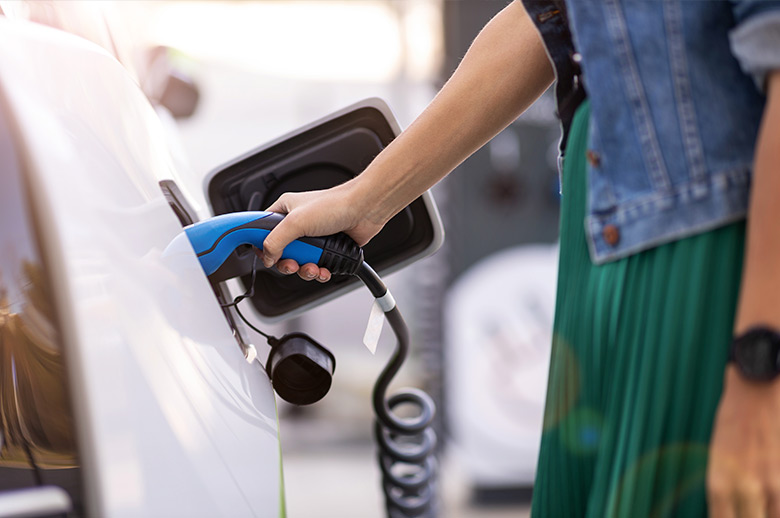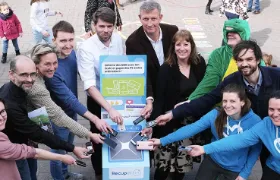The case for electric company cars at Proximus
A few years ago, I replaced the fuel-based heating in my house with a cogeneration system, an energy-efficient way of generating both heat and power. I made this decision because I wanted to future-proof my household by adopting a greener way of consuming energy. The next part of that project is to switch to an electric vehicle – which will be charged with the green energy I produce in my own house.
I’m telling this story not to brag, but to illustrate that the switch to sustainable energy solutions is one that is becoming more feasible day by day thanks to swift advances in technology. We are seeing the same evolution in our vehicle fleet at Proximus. In the same way as in my household, the switchover to more EVs in our fleet is just one part of a larger, well-considered energy and mobility strategy.

I’d like to show you how we use our position as leading telecom operator in Belgium to drive change in the mobility sector, to convince more employees to embrace electric driving, and to play our part in combating climate change in close collaboration with our partners.
An energising experiment
Proximus is committed to stop buying cars that require fossil fuels by 2025. To make that transition possible, we need to prepare. That’s why we started an experiment in 2019 with about a dozen volunteer employees who switched to EVs. There was plenty of trust in the cars themselves; charging them was the challenge.
The experiment became a success thanks to our use of smart home charging cables in collaboration with Powerdale. This option has since been integrated into our mobility budget platform, making repayments even easier. The next step, with syndicate clearance, would be to make it possible to install charging boxes in employees’ homes as part of the mobility budget. This would remove the last element of friction around charging electric cars.
In the meantime, hybrid cars are a good alternative to EVs, especially when integrated in the mobility budget. These cars can drive 30-50 km on battery alone, which is enough for some to get to the office on electricity, while others can combine a car trip to the station with a train ride to the office without producing any CO2. Today, one car order in three in our fleet is already a hybrid car but, with our new list of company cars carefully prepared on the basis of Eco Scores, we think there will be a very strong increase in orders for hybrid and full electric cars. This will be an important asset in achieving our company targets for reducing CO2 emissions.
An evolving car market
There are plenty of often-heard arguments against electric vehicles. Their range is too small. They charge too slowly. There aren’t enough charging points. Luckily, most of these arguments are already outdated or quickly becoming so. The car market is undergoing a rapid transformation. It’s very clear that EVs are the future: every car brand and energy company is investing in the transition. But the first fruits of that transformation already make EVs feasible today as company cars.
The price of EVs is no longer a good argument against them. Prices are coming down year on year, with lower maintenance costs, longer life cycles and major fiscal advantages already making EVs hardly more expensive than fossil fuel cars on the whole. Equally, charging times are coming down and more charging points are becoming available, with companies like Total Energies investing significantly. And most EVs today have a range of 300-400 km per charge - which makes the limited range argument redundant in all but the most exceptional of cases.
All of this means that the major challenge for an electric transition at the moment is not the technology but, rather, the awareness and education of car users. A lot of people pick their car based on their hobbies or holiday plans. But with range and pulling power no longer an issue, the arguments against EVs disappear. It’s a question of demonstrating this to employees and incentivising them to choose change, e.g. through the mobility budget.
The importance of partnerships
It should be clear by now that the success of transition to green mobility within a company depends on many factors, including availability of the right vehicles and adjacent technologies, the integration of diverse mobility options and, most of all, a joint willingness to create change. This is why partnerships are essential. Partners like Vaigo, ‘o2o’ bike lease, Total Energies, Powerdale and the many public transport companies and bike-sharing companies we work with enable us to implement solutions that work for our employees.
This works both ways: our partners enable our ambitions, while our company size and profile also allow us to set the bar very high and stimulate other players in the mobility and energy industries to come up with innovative solutions. Thanks to these collaborative efforts, we can make the mobility of tomorrow possible today.



